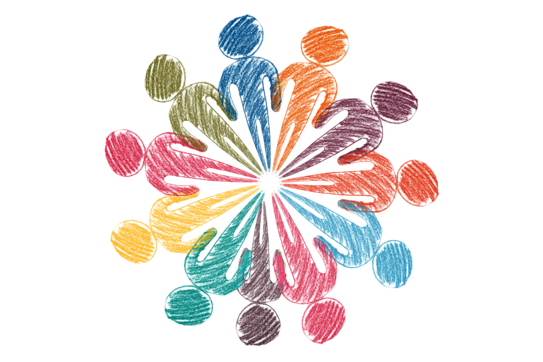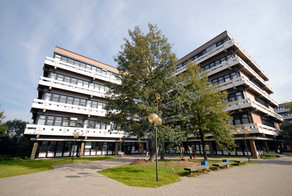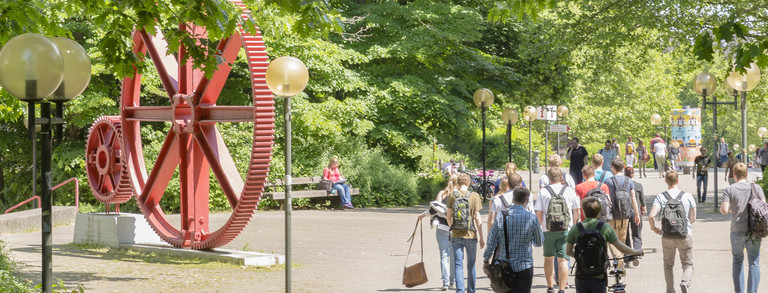Study Programs
Here you will find an overview of the Bachelor's and Master's degree programs. The Department is the second largest training location in the field of special education and rehabilitation in the Federal Republic and offers degree programs geared towards the teaching profession and fields of work in social and vocational rehabilitation.

Special Education (Teacher Training)
The degree program provides:
- Fundamental professional competencies for teaching and education, assessment and counseling, and evaluation and quality assurance,
- methods of thinking, acting and reflecting on school practice,
- basic knowledge and skills for the identification of special educational needs and the preparation of individual support plans.
There are the following specializations that can be studied within the degree program:
The special focus on language and communication focuses on the special educational needs of children and adolescents whose acquisition of language and communication skills is so extensively impaired that it cannot be adequately addressed by general educational support. These impairments may be specific to language acquisition or may arise as a result of intellectual or sociocultural conditions. The goals of speech therapy intervention are to enable social participation in everyday language situations as well as the use of language in different registers (such as technical language and educational language) for the construction and structuring of knowledge in all educational processes at school.
The special focus on learning focuses on the teaching of competencies for the diagnosis and individual support of students in difficult learning and living situations in inclusive settings and at special schools. In addition to basic theories and models in the specialization of learning, the focus of the program is on didactics and methodology of teaching in heterogeneous learning groups, in particular concepts of internal differentiation and cooperative learning, diagnostics and individual support, especially in the learning areas of language and mathematics as well as social learning, career orientation, new media and historical and political learning.
Impairments in physical and motor development are manifold in nature and degree of severity. They almost always affect basic areas of learning and development and can be linked to a wide range of consequences and accompanying symptoms in perception, communication and cognition. The study of physical and motor development deals in a differentiated manner with the associated support needs in the context of the respective environments. Specific competencies are acquired, for example, in the areas of medical basics, augmentative and alternative communication, inclusive media education, para-sports and movement, as well as in the design of educational processes with students with complex impairments or with life-shortening illnesses.
The specialization in mental development addresses the educational needs of people with intellectual disabilities and/or high support needs and their participation in culture and society. The focus is on the teaching of pedagogical-professional possibilities of action along the different phases of life as well as didactical questions of the learning and development needs of this group of people.
The Emotional and Social Development focus deals with disorders in emotional experience and social behavior. In addition to conceptual foundations, the program aims to provide scientifically based knowledge on manifestations and diagnostics, explanatory models as well as prevention and intervention of disorders of social and emotional development in inclusive contexts of education, work and health. In particular, students develop competencies in the areas of counseling, diagnostics, teaching, support, as well as evaluation and apply them in (school) practical contexts.
The specialization in vision deals with blindness, visual impairment and visual perception. Focal points in the study are neuroscience, principles of visual perception, functional diagnostics of vision, developmental and appropriation conditions in blindness and different visual perception, self-determination, specific technologies, the teaching of methodological and didactic competencies in initial instruction (cultural technology) and in challenging subjects (art, sports, natural sciences). Specific issues of inclusive teaching, early intervention for children with blindness and visual impairment as well as issues of vision loss are considered in the study.
Further information about each specialization can be found on the professorships websites.
Rehabilitation Sciences
The program provides:
- knowledge, skills and methods in the fields of social rehabilitation and pedagogy, disability assistance and the social and health care system
- prepares students for work in various fields of occupational and social rehabilitation in the areas of rehabilitation, therapy, pedagogy and organization
The Bachelor's degree in Rehabilitation Education is a first professional qualification that also forms the basis for further Master's degree courses. The course covers the broad fundamentals of rehabilitation-scientific and pedagogical approaches and methods as well as the possibility of individual profiling in special subject areas. It enables students to use their acquired specialist knowledge to identify the need for help and to design appropriate living spaces.
Further information about each specialization can be found on the professorships websites.




